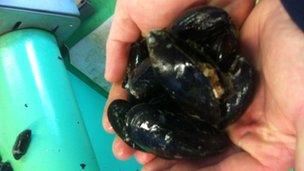Shetland shellfish sites close after high toxin levels found
- Published

A total of 11 shellfish harvesting areas in waters to the north and west of Shetland have been shut
All shellfish harvesting sites in Shetland have closed and mussels from the islands withdrawn from sale after unusually high levels of toxins were detected.
The Food Standards Agency said the naturally-occurring toxins can cause acute food poisoning.
The move came after about 70 people in south-east England reported symptoms of diarrhetic shellfish poisoning.
The cases have been linked to the eating of mussels from Shetland.
It was after the harvest of these mussels that the FSA recorded the high levels of toxins during its weekly monitoring programme.
According to the FSA, the toxins are produced by marine phytoplankton and levels are typically higher in summer.
A total of 11 harvesting areas in waters to the north and west of the islands have been shut by Shetland Islands Council and businesses operating in the remaining nine areas have decided to voluntarily stop commercial harvesting.
'Unprecedented'
Maggie Sandison, executive manager of environmental health at Shetland Islands Council, said: "This year we've seen an unprecedented amount of toxin and the levels have increased from one week to another higher than we've ever seen before."
Shetland Mussels, which supplied the affected shellfish, has told the FSA that all of their customers have been contacted and all mussels from that batch have been consumed or disposed of.
Shetland Mussels managing director Michael Tait said: "This is the first time that we have experienced a problem with customer illness in our 16 years of production.
"Shetland Mussels is SALSA (Safe And Local Supplier Approved) approved with full traceability, which has allowed us to isolate the affected batches, and this system has worked well in this situation.
"We have been proactive in working with the customers and the authorities in investigating this incident."
Investigation launched
Ruth Henderson, chief executive of Seafood Shetland, said the trade association was satisfied Shetland Mussels followed the correct procedures and that a full investigation was under way.
She said: "Diarrhetic shellfish poisoning is caused by naturally-occurring algal blooms.
"The recent warmer temperatures have led to an unprecedented level and increase of algal blooms.
"Because shellfish is particularly delicate and susceptible to tainting, growers are always very cautious about maintaining the quality of the product."
Ms Henderson added: "As a result, a voluntary withdrawal of all Shetland mussels from the market has been undertaken until the current high levels of toxins in the water has subsided."
The FSA said mussels were supplied to a number of restaurants, with customers reporting being unwell after eating at establishments across south east England.
Last month, members of the public were advised not to eat clams and mussels from two areas of Fife, after high levels of toxin were found in shellfish.
Fife Council said routine sampling found evidence of Paralytic Shellfish Poisoning, commonly known as PSP, in surf clams from Anstruther and Pittenweem.
- Published29 June 2013
- Published11 January 2011